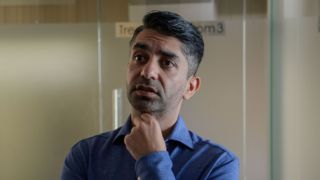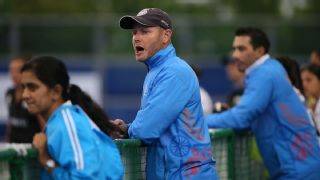|
Vinesh Phogat laughs as she picks up the phone. It's surprising since she doesn't have much to be happy about. A few minutes before on Tuesday evening, Vinesh has learned that the Tokyo Olympics, scheduled to be held from July 2020, are being postponed by a year. As the world battles the COVID-19 pandemic, a global sporting tournament is no more than a health hazard - bluntly put, a distraction. The Olympics have been the sole focus for Vinesh, though. The 25-year-old has been preparing for the Games for four years now. She has come back from a near-career-ending knee injury that she suffered in the last Olympics in Rio to chase that elusive medal. Blood, sweat and tears have been shed in this pursuit. Now, four months away from her potential prize, she has had the wind knocked out of her. "Has rahi hu kyuki ro bhi nahi sakti (I'm laughing because I can't even cry right now)," she tells ESPN. Vinesh found out about the postponement in the wrestling hall of a school in the Kharkhoda village of Haryana. "I was completing my stretching after my circuit training when I saw the messages coming in on my phone. I didn't want to look at them because I knew what they were going to be about. And when I saw that the Olympics have been postponed, I just stopped what I was doing and went home. It's like I was a child and had something in my hand and it was snatched away." Spirits would have deflated similarly in shooting ranges, hockey fields, training halls and weight rooms across India. The dreams of 74 Indians who had qualified for the Olympics will have to be put on hold. "It's tough when it's so close you can smell it," says Santiago Nieva, the high performance director of the Indian boxing team, of which nine had qualified for the Olympics at this months' Asia-Oceania qualifiers in Amman, Jordan, where they were moved to from Wuhan, where the coronavirus outbreak began. Nieva, currently in self-isolation in his room at the National Institute of Sports in Patiala, broke the news to his boxers on the team's messaging group. He knew how they would take it. "It's so demotivating, you know. It's like, 'what? I have to wait for one more year?' What else would they feel," he says. It isn't just a matter of biding time, waiting for the COVID-19 pandemic to clear and then picking up where they left off. "It's going to need lots of recalibration of plans, and refocusing because now with this postponement by a year, current form, fitness, confidence, momentum goes out of the window," says former hockey captain Viren Rasquinha, who supports high performance athletes through the Olympic Gold Quest foundation. Any built-up momentum, quite simply, has ground to a halt. "Sab kuch shuru se karna padega. (Everything will have to start all over again)," says Vinesh. "All this training almost seems like a waste. I would get up with a purpose every day. I was training with such intensity because I knew that I had the Olympics in front of me." Now that what they assumed was the final lap of their Olympic preparation, isn't, athletes and coaches have to adapt. "The tempo and momentum of preparation will change completely," says Vijay Sharma, chief coach of the Indian weightlifting team. While athletes are obviously disappointed, in a sense the IOC's announcement on Tuesday had an element of mercy. Ever since the COVID-19 pandemic started spreading across the world and sporting competitions were cancelled one after another, athletes struggled to contain fears that the Olympics would be next to be axed, while they trained as if it were on schedule. "Normally I try to avoid negative thoughts. But a few days back I heard about the possibility of it getting cancelled on TV just before I went out to train," Vinesh says. "When that happened, I was so depressed, I just lay down on my bed for 15 minutes. I thought, 'should I even go and train?' But I forced myself to get up. You tell yourself things will be better even though you know inside it's not likely to happen." The fact that Vinesh was holding on to a faint glimmer of hope comes as no surprise to Olympic gold medallist Abhinav Bindra, who as member of the IOC's athletes commission, says he was receiving precisely this feedback from athletes around the world. Despite the disappointment he expects them to feel, Bindra says eventually players will be glad they got some finality. "I think in these times, there has also been a lot of mental pressure on the athletes because of the uncertainty surrounding the Games and this is what we've worked for all our lives and I think that suspense is killing," he says. "This decision should also ease their minds a little. In current times, this is the best that could have happened."  "It is easier to create to a peak cycle for a year forward. If the Games was put forward for only two months, I think that is much tougher. You have created a cycle which is for July and if the games move to September, that is much harder to work with. Because you've planned your training loads you have planned for competitions which are now anyway getting cancelled. You can't just go to an Olympics without competitions." But while a year's delay might be a surmountable obstacle for younger athletes, it might not be so for those at the end of their careers. Achanta Sharath Kamal, 37, is one of them. "I don't know where it leaves me," Sharath says. He hasn't yet qualified for the Olympics but was expected to do so at the Asian Qualifiers, originally meant to be held next month. With the cancellation of qualifiers, those plans are in jeopardy. "The qualification process (for the 2021 Olympics) now is still unclear. I started serious preparation for 2020 Tokyo after the 2018 Asian Games and really hit Olympic-level training around November last year and it's taken me so long to get here. Now I have to prolong this process for a year - to peak and periodise, it's quite difficult. Now I have to scrap everything and say, 'okay, one more year on the tour.' When you have a family, it's difficult because you're not the only one making sacrifices." It's a hard call, one that Bindra, who stepped away from the sport after competing at the Rio Olympics at the age of 34, is familiar with. "There could be a percentage of athletes who are at their tail end like I was in Rio and I am sorry this is just a scenario of what has come into play. You have to accept the situation and see if you have the reserve left in you, a little bit of fuel left, you push on for another year but I think it is a personal decision to make." Sharath isn't the only athlete who was looking ahead to a life beyond the Olympics and will now have to take stock once more. Boxing's Vikas Krishan Yadav had signed with a high-profile boxing promotion last year but had given up his professional ambitions in order to compete in his third Olympics. Boxing's high performance director Nieva knows the lure of a professional career is a lucrative one, so he admits to being worried when he got a call from Vikas on Tuesday evening. "I know in a lot of other countries, it's going to be difficult to retain boxers for another year, especially if they want to go professional," Nieva says. "I was a little worried when Vikas called me today. But he only said he was going to stay with the team for another year." Indeed, there are some who are willing to look at the bright side of a one-year delay. The Indian women's hockey team took the news rather well, according to coach Sjoerd Marijne. "Though it is disappointing, the girls told me, 'It's okay, coach'. We will continue to work the way we are and this probably gives us more time to prepare for the Olympic Games and be our best."  That's the theory weightlifting coach Vijay Sharma also believes in. "We were obviously in very good shape for this Olympics so it's disappointing not to be able to go this time," he says. "But the new dates only give us more time to prepare. I was telling Mirabai Chanu that this year has been given to us by god and we have to use it well. We also have a very young weightlifter in Jeremy Lalrinnunga. He's improving very rapidly and he could get much stronger by next year." Vinesh isn't seeing that far ahead, though. She is distraught. And while many athletes might put on a brave face, they likely feel the same way. "I know I won't sleep well today," she says. "I know a lot of athletes are going to feel the same way for the next 10 to 15 days. This is the same feeling I had after I got injured. I didn't know what I was going to do. What I was training for. What's the purpose of trying to do anything." Bindra can empathise, but he knows Vinesh and others like her will overcome this predicament. "The athlete population is the most resilient population that I know of. They will overcome the challenges of preparation and change of plans," he says. The situation might even force athletes to shed their tunnel vision and perhaps grow as individuals "I think it is also an important time to realise and step back a little bit and think that yes, sport is important but it is not the only thing in life. This also gives an opportunity to bond with their families and appreciate the little things in life. At the moment all these athletes live in that bubble that sport and performing at the Olympics is the most important thing in their universe and rightly so, I was one of them as well. "This scenario also gives them a great learning and an opportunity to evolve that I think that will hold them in good stead not just in sport and on the field of play, but in life." Vinesh has dealt with disappointment before, overcome them to become India's strongest woman wrestler. Yet, she will have to stew in her own disappointment. "Normally when I am really angry about something, I'll just leave that place and go somewhere. Now [with the country on a lockdown for 21 days, starting March 25] I can't even do that."
|

